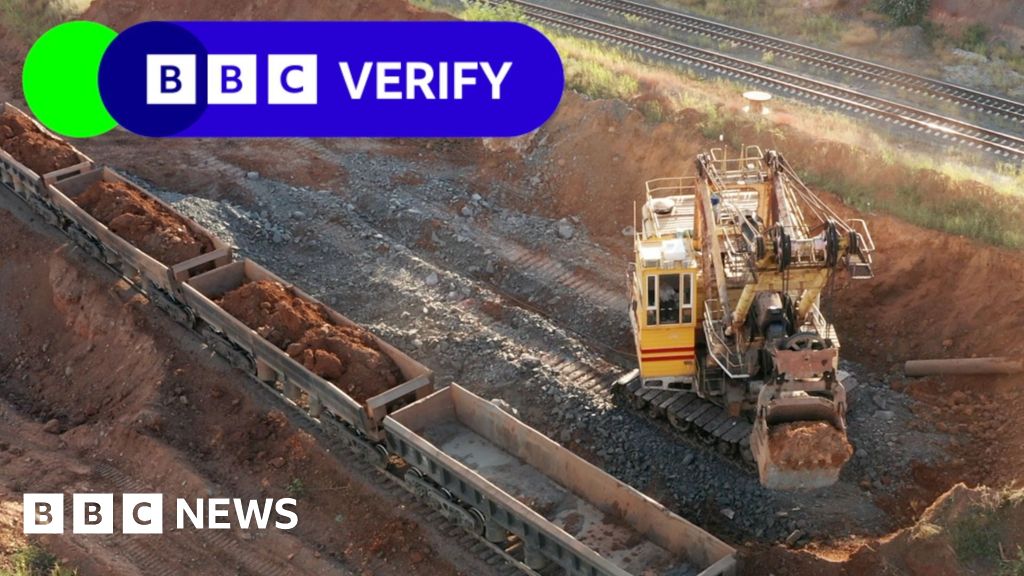ARTICLE AD BOX
Watch: Understand the Ukraine crisis with Ros Atkins in less than six minutes
Russia has condemned a US decision to send extra troops to Europe to support its Nato allies amid continuing fears of a Russian invasion of Ukraine.
Moscow said it was a "destructive" step which heightened tension and reduced the scope for a political solution.
The Pentagon said 2,000 US troops would be sent from North Carolina to Poland and Germany, and a further 1,000 already in Germany would go to Romania.
Russia has some 100,000 troops near Ukraine. It denies planning to invade.
The tensions come eight years after Russia annexed Ukraine's southern Crimea peninsula and backed a bloody rebellion in the eastern Donbas region.
Moscow accuses the Ukrainian government of failing to implement the Minsk agreement - an international deal to restore peace to the east, where Russian-backed rebels control swathes of territory and at least 14,000 people have been killed since 2014.
Responding to US President Joe Biden's decision to deploy extra troops to Europe this week, Russian Deputy Foreign Minister Alexander Grushko said it was a "destructive" and an "unjustified" step.
Speaking on Wednesday, Mr Grushko added that it would "delight" the Ukrainian authorities, who would continue sabotaging the Minsk agreement "with impunity".
The Pentagon earlier said the American troops being deployed would not fight in Ukraine - but would ensure the defence of Washington's allies.
Their deployment is in addition to the 8,500 troops the Pentagon put on alert last month to be ready to deploy to Europe if needed.
"It's important that we send a strong signal to Mr Putin and, frankly, to the world that Nato matters to the United States and it matters to our allies," Pentagon spokesman John Kirby told reporters on Wednesday.
But on the question of alleged invasion plans by Mr Putin, he said: "We still don't believe he's made a decision to further invade Ukraine."
He also said a US proposal "leaked to a European news outlet" was genuine. He appeared to be referring to a story in Spain's El País newspaper about a US offer of talks with Russia on cutting back on nuclear weaponry and trust-building measures in exchange for reducing tensions over Ukraine.
Meanwhile, intense diplomatic efforts continued to try to find a political solution to the crisis, amid fears it could blow up to a full-scale war in Europe.
Russian President Vladimir Putin discussed Ukraine with UK Prime Minister Boris Johnson by phone on Wednesday.
Mr Johnson told Mr Putin "all European democracies have a right to aspire to Nato membership", a Downing Street statement said. Russia opposes Ukraine joining the security alliance.
Mr Putin drew attention to Nato's reluctance to respond appropriately to Russia's justified concerns", the Kremlin said in a statement (in Russian).
The Russian president earlier accused the US of trying to draw his country into a war in Ukraine. He said America's goal was to use a confrontation as a pretext to impose more sanctions on Russia.
Separately, President Biden and his French counterpart Emmanuel Macron "affirmed their support for Ukraine's sovereignty and territorial integrity," the White House said in a statement.
In a phone call, they reviewed "ongoing co-ordination on both diplomacy and preparations to impose swift and severe economic costs on Russia should it further invade Ukraine," the statement said.
A message to Putin
These are combat-ready troops but they are not expected to be fighting Russian soldiers - if they were the deployment would be much bigger. After all Moscow is not seen to be directly threatening Poland and Romania.
So their greater value is symbolic: to reassure Nato allies in eastern Europe who are worried that the Russian military build-up around Ukraine could spill across their own borders, and who have requested reinforcements. And to send a message to Vladimir Putin that Nato matters to the US. So any move he might make on Nato allies would trigger Article 5 commitments to come to their defence.
Joe Biden is trying to show this resolve without undermining chances of a diplomatic solution. He is not sending a lot of troops, and notably, none to the Baltic states right on Russia's doorstep.
But these deployments are the most concrete sign that the current crisis is broader than Ukraine, that it's over the post-Cold War security infrastructure in Europe.
Rivalry between Russia and the US, which still possess the world's biggest nuclear arsenals, dates back to the Cold War (1947-89). Ukraine was then a crucial part of the communist Soviet Union, second only to Russia.
Mr Putin said the US had ignored Moscow's concerns in its response to Russian demands for legally binding security guarantees, including a block on the Nato alliance's further expansion to the east.
Romania, which is hosting some of the newly deployed US troops, is home to a US-built Aegis land-based missile defence station, which Russia has described as a security threat since it opened in 2016.

 3 years ago
30
3 years ago
30








 English (US) ·
English (US) ·